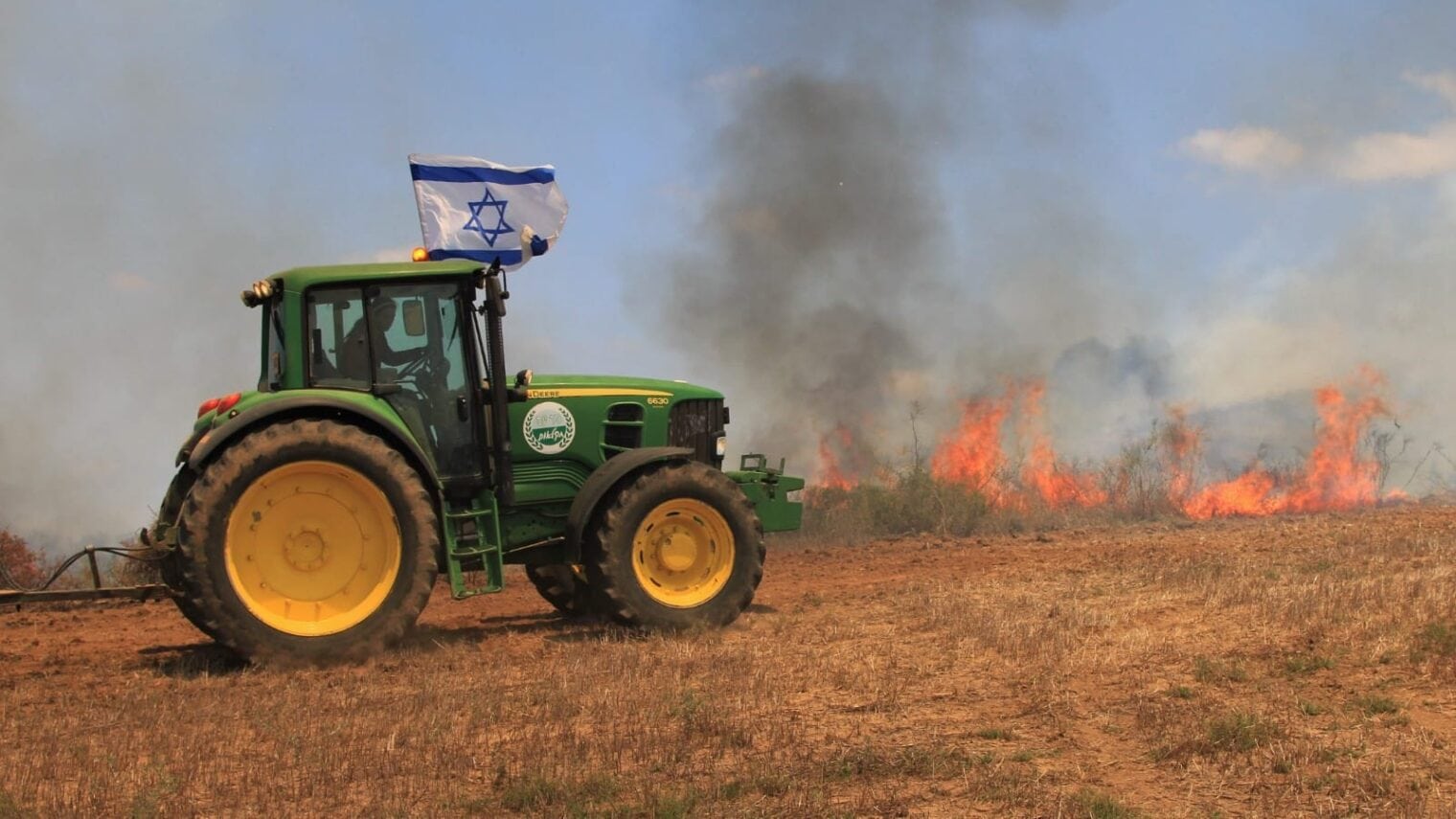Israel’s farms are in crisis after the Hamas massacre on October 7 that claimed over 1,400 lives.
Half the agricultural workforce vanished overnight, leaving crops to rot in the fields and livestock to fend for themselves.
An estimated 23,000 migrant workers from Thailand have gone home in fear. Thousands more Palestinian workers are no longer allowed to come to work.
Many Israeli farmers have been drafted to the army. Some were injured, murdered or abducted by Hamas to Gaza.
The result is a very real danger that Israel will go hungry. Or that a nation that is becoming increasingly self-sufficient will be forced to bring in many more shipments of costly fruit, vegetables, milk, meat, poultry and eggs from abroad.
HaShomer HaChadash (The New Guard) is desperately trying to plug the sudden workforce gap, pairing up farms in need of workers with volunteers keen to help.
“Every farmer tell us they need help, they need working hands,” says Tamar Appel Houminer, who manages the organization’s operations room in Kidmat Gal, near Tiberias in northern Israel.
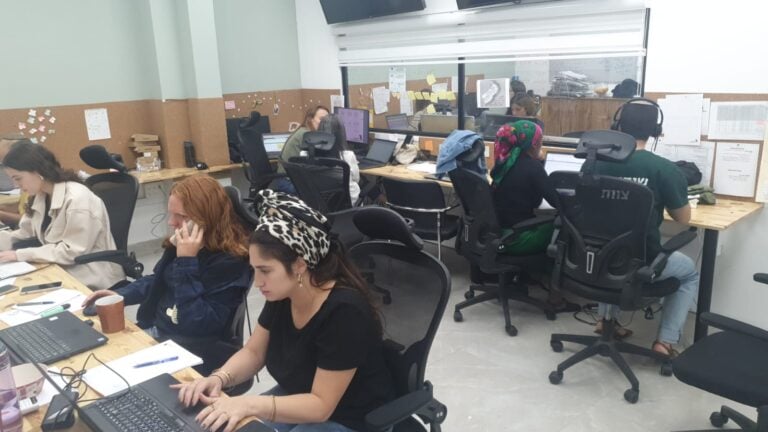
“One of the farmers that came to me today needed help picking celery. There’s a very small window when it has to be picked. If we don’t pick it in the next three days, it’s going to be thrown away,” she says.
Thousands want to help
“From the day the war started we’ve been focused on two things. First is assistance in safeguarding the farms. And the second, which is a bit more complicated, is allocating volunteers to farmers who need help,” Houminer explains.
“For example, I spoke with the wife of a farmer today. Her husband is in the reserves, and she’s taking everything on. She doesn’t know what she needs to do. So she needs someone permanent to come and stay with her to help her.”
HaShomer HaChadash deploys professional farmers to help those in such need, but its primary aim is to recruit a workforce of willing but untrained volunteers who can pick strawberries, pull up celery or harvest cucumbers.
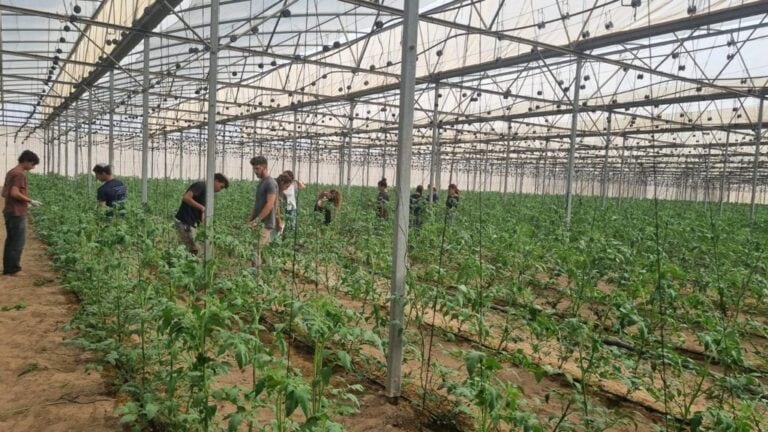
“At the moment we have around 2,500 people who have filled out our forms, as well as about 800 groups who want to come, and I’m guessing each group is a minimum of five people,” says Houminer.
“A lot of high-tech companies want to come as well, with maybe 100 people. It’s so exciting to see Am Yisrael [the people of Israel] coming together.
“But we have a lot of work to be done because we still don’t have enough volunteers. A lot of people are afraid to get out of their houses and I completely understand.”
The next generation of farmers
HaShomer HaChadash was founded in 2007, originally to protect farmers from a crime epidemic, but its role has since expanded.
It now operates four high schools, called Adam V’Adama, educating a new generation of 14- to 18-year-olds to love the land and connect to its soil.
“We’ve taken over a lot of fields and we’re trying just to maintain them and keep the agriculture going,” said one student, Eliya Horodishetz, 17.
“I’ve been doing maintenance on a date field, taking care of the palm trees, but we also have tomatoes, peppers, all sorts of things. Before I joined the school a year ago, I had no experience working on the field. But now I feel like I’m getting the hang of it.”
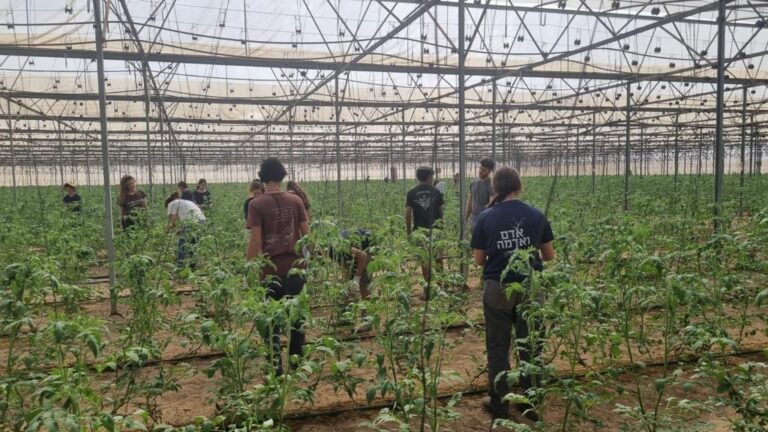
Eliya is one 75 students at Adam V’Adama’s Arava boarding school, in a relatively safe location in Hatzeva, south of the Dead Sea on the Jordanian border.
They’re currently hosting more than 60 students from another of the organization’s schools at Kfar Silver, near Ashkelon, which is just 10 kilometers (6.2 miles) from the Gaza border.
Together they’re helping nearby farms that are struggling to harvest crops and maintain their fields. And, with parental permission, some students are also helping on farms closer to the Gaza “envelope” — with the ever-present risk of rocket attacks.
Gila Raz, English coordinator at the Arava school, said: “Students were already stepping into to help out with the dire situation of Israeli agriculture. Before the war, this was a problem. Now it’s a bigger problem. Luckily they have experience and are able to take on responsibilities.”
Raz explains that these young people are carrying a double load.
“They complete Israel’s full matriculation program of academic studies, and they get up at five o’clock in the morning and work for half a day in the fields. This is practical Zionism, this is getting your hands dirty.”
Overwhelming needs
The area bordering Gaza is home to around three-quarters of Israel’s agricultural activity, and that’s making matters worse.
Residents of the kibbutzim and moshavim (agricultural communities) evacuated in the immediate aftermath of the deadly Hamas attacks, abandoned their unfed chickens and unmilked cows, as well as their crops.
Some fields are still too dangerous to tend, because of machine-gun and antitank fire from terrorists, designed specifically to deter farmers.
Irrigation and power supplies have been disrupted, cowsheds and other buildings burned to the ground, and infrastructure destroyed.
HaShomer HaChadash’s long-time partner, farmer Liran Almosnino, 42, was killed last week while battling Hamas terrorists in the Gaza envelope. HaShomer’s pre-army volunteers decided to continue the work on his farm and assist other farmers in the region who have been left with no working hands.
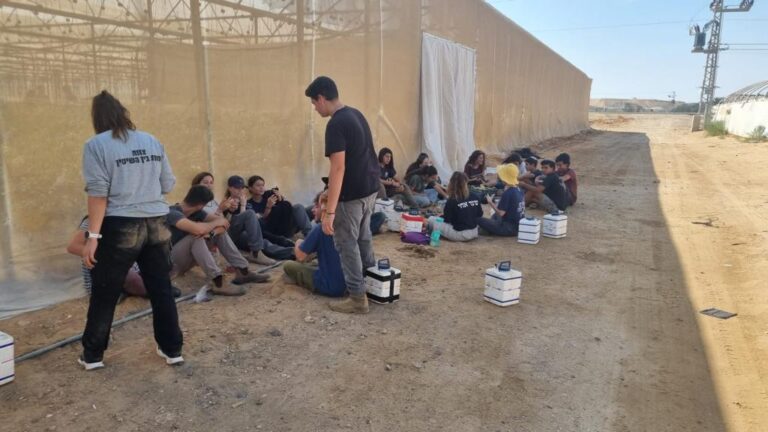
Right now, strawberries, sweet potatoes, cucumbers and avocados all need harvesting, tomatoes need planting, eggs need to be collected and crops need to be sprayed.
HaShomer HaChadash can’t fix everything, but it’s making a difference.
“The main thing we’re trying to do at the moment is making sure no farmer is left alone,” said Houminer.
Have a tractor license?
So what’s it like being a volunteer?
“In Kadima, in the center of Israel, we have five or six farmers who are picking strawberries. They explain what you need to do, and it’s as easy as it sounds,” says Houminer.
“Or maybe you’ll prepare the land for a new crop. We also have farmers who could use people with a tractor license.”
There is also a need for egg collectors. The IDF’s biggest egg supplier told HaShomer HaChadash he desperately needs working hands.
“We send him a group of people. Unfortunately, a lot of bombing started at the same time and the army shut us down. So we’re trying to find a solution for that at the moment,” Houminer says.
“Volunteers can come for a day, they can come for a week, whatever suits them. We’d love to have them and the farmers would appreciate any assistance.
“We’re trying to make a match made in heaven for every farmer who needs the assistance.”
To volunteer, call HaShomer HaChadash on 050 6347946.




